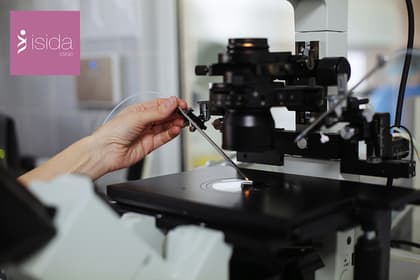Preimplantation genetic diagnosis - timely detection of genetic diseases

Surely, all parents-to-be want their children to be born and to grow up healthy and strong. However, it is not always possible. There are a number of genetic inherited diseases that not only increase the risk of having a sick child, but can also lead to an unsuccessful IVF attempt. Approximately 70% of success in implantation depends on embryo quality, because in most cases the embryo with genetic damages does not survive - this is the natural protective mechanism of the woman's body. Fortunately, with a timely medical examination, we can determine possible problems with the embryo and identify the presence of genetic abnormalities before the onset of a critical moment.
PGD (preimplantation genetic diagnosis) is a diagnostic examination used in IVF, which makes it possible to minimize the risk of passing genetic diseases to a child before pregnancy. Diagnosis of the embryo for possible genetic diseases allows identifying risks even before it is transferred to the uterus, which significantly increases the chances for onset of pregnancy and the birth of a healthy baby. During the PGD procedure, embryos are examined for chromosomal abnormalities or genetic mutations, while superovulation stimulation, puncture of the oocytes, eggs fertilization and embryo transfer are carried out in the same way as in the usual IVF program. It is important to understand that this procedure does not harm the embryo, and it continues its normal development.
Any genetic disease associated with the presence of a known gene mutation can be determined through preimplantation diagnosis: chromosomal aneuploidy and translocations, as well as diseases associated with the presence of mutations of individual genes.
PGD is recommended in following situations:
- if one of the parents has chromosome translocations;
- in cases of several unsuccessful IVF attempts;
- if the mother is over the age of 35;
- in case of recurrent miscarriage;
- if there was a pregnancy with fetal chromosomal abnormalities in the past.
Last year in November, ISIDA clinic was one of the first in Ukraine to introduce an ultra-precise modern method for diagnosing embryos - PGS NGS (Next Generation Sequencing). This method allows detection of chromosomal pathologies with an accuracy of 99.9% that makes possible avoiding the birth of an unhealthy child and significantly improving the effectiveness of the IVF program.
Application of innovative diagnostic methods in the field of ART in ISIDA clinic allowed many couples to make their cherished dream come true and experience the joy of parenting!
Contact us!
Phone: +380 (44) 455 88 14
Viber: +380 (67) 333 88 14
Skype: ISIDA International
Address: 65, Vatslava Gavela Blvd, Kyiv, Ukraine